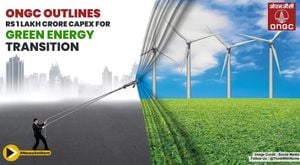With the arrival of warmer temperatures, Japan is bracing itself for the onset of pollen season, particularly the highly allergenic cedar and cypress pollen. This year's predictions indicate unprecedented levels of pollen, making it one of the most challenging seasons for allergy sufferers.
Starting from Saturday, February 15, and extending through Sunday, February 16, regions like Tokyo and Shizuoka are expected to experience increased pollen dispersion, coinciding with unusually high temperatures for this time of year. According to reports by local weather stations, warm air will significantly contribute to pollen release, particularly with the sunny weather expected throughout the weekend.
The Japan Meteorological Agency has warned residents to prepare for what could be one of the most severe pollen seasons on record, with pollen counts forecasted to be approximately twice as high compared to average years and three times higher than the previous year's levels. A meteorologist from KTS Weather Center, Masanori Arai, noted, "Conditions such as sunny days followed by rain can trigger substantial bursts of pollen release."
During February, pollen from cedar trees will begin its ascent, with the season expected to peak around late February, closely following by the cypress pollen peak expected from late March to early April. The unique climatic interactions during this transitional season require those susceptible to allergies to take extra measures.
Weather patterns play a significant role in pollen levels. On dry, windy days, pollen disperses far and wide, leading to higher counts. It's not uncommon for pollen levels to exceed 100 grains per square centimeter during peak periods, particularly following warmer spells after rainy days. Following rain, the pollen trapped on the ground is redistribution, resulting in even greater concentrations.
Local authorities are advising allergy sufferers to check weather forecasts daily, as pollen counts could change rapidly with warm spells, making it necessary to take preventive actions.
Residents of Kinki and beyond are encouraged to explore various protective measures, such as wearing glasses to reduce direct exposure to airborne pollen, and using masks to filter inhalation. It's noted those using specially-designed masks can reduce the inhalation of pollen by approximately one-third to one-sixth.
A new trend this season is the availability of numerous allergy relief products, aimed at easing the discomfort for those afflicted by pollen sensitivities. Stores have reported stocking up on nasal rinses and pollen-blocking masks. These innovative products cater to those at risk, with many employees at local stores demonstrating their use and effectiveness.
While some areas still see relatively low pollen levels at this stage, experts predict significant increases as temperatures continue to rise and strong winds promote dispersal. Afternoon days with clear skies are particularly concerning, as pollination surges rapidly with such favorable conditions.
Cautions extend beyond pollen management through clothing choices. It's well advised to avoid wearing wool, as it's reputed for catching more pollen grains. Instead, opting for smoother fabric surfaces can minimize the unexpectedly high counts brought indoors.
With this annual return of pollen, officials remind residents about the importance of adequate information dissemination on current pollen levels to aid planning outdoor activities. With the phenomenon of allergy season accounting for sudden increases of pollen, it’s prudent for many to equip themselves with knowledge on pollen forecasts, prominent triggers, and emergency management practices.
Preparation doesn’t only encompass personal precautions, but also includes community strategies directed at minimizing the impact of high pollen counts on public health. The Environmental Agency has recently recommended proactive health measures on days classified as having "extremely high" pollen levels, encouraging individuals to opt for telework and limit outdoor activities.
Prognosis for this allergy season indicates challenges, but with diligent efforts and strategic measures, residents can navigate through the haze of pollen, breathing easier knowing they are prepared.



